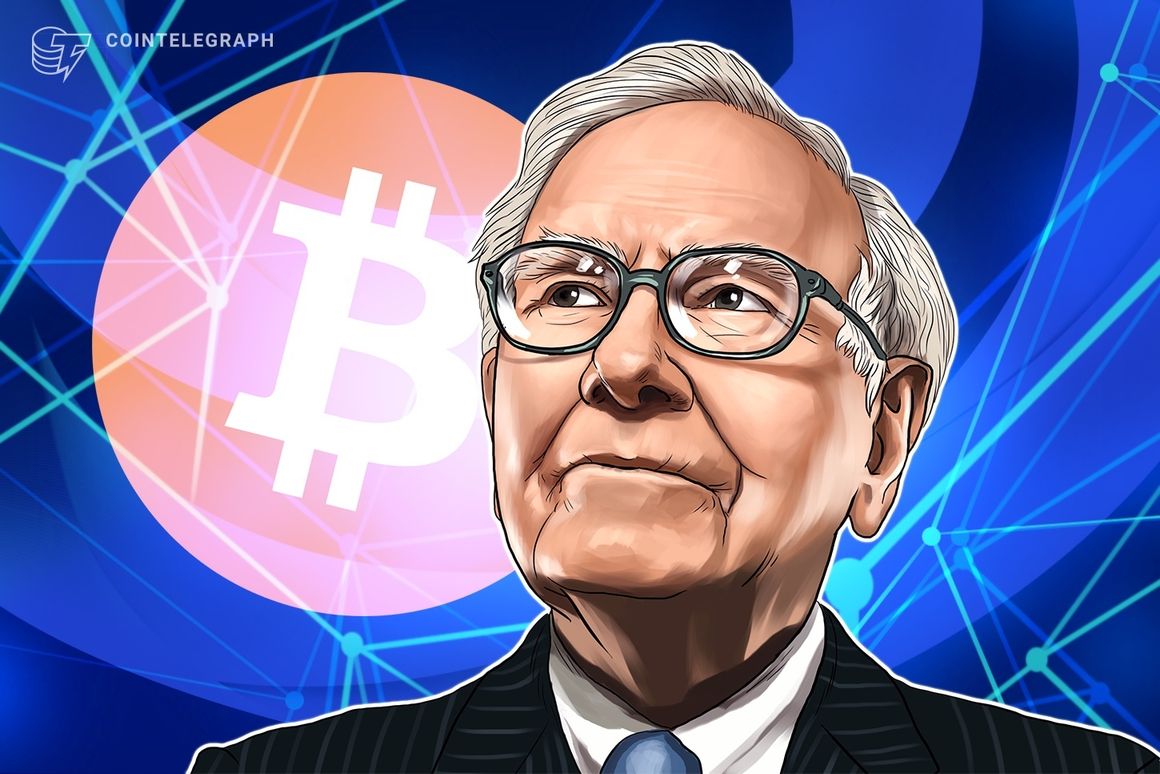Bitcoin continues to outperform Warren Buffett’s portfolio, and the gap is set to widen

[ad_1]
Warren Buffett, the renowned investor and chairman of Berkshire Hathaway, celebrated his 93rd birthday on Aug. 30. Throughout his lengthy career, he has adhered steadfastly to a value investing strategy that bears some resemblance to the “buy and hold” approach often associated with cryptocurrencies.
However, Buffett’s focus is on assets with strong earnings potential and investing in companies and sectors where he and his team possess a deep understanding of the associated risks, competition and advantages.
The question is whether such a laser-eyed strategy can outperform Bitcoin (BTC) in the long run. Moreover, investors should question why one of the greatest stock pickers of all time currently holds cash and short-term bonds as the second-largest position in his portfolio.
An interesting example of his approach is Berkshire Hathaway’s largest holding, Apple (AAPL) shares. Berkshire initially acquired these shares in early 2016 when Apple was already valued at over $500 billion, so the firm was far from being an early investor. Notably, Berkshire Hathaway continued to add to its AAPL investment in 2022, even though the stock had rallied over 500% since its initial purchase. This illustrates Buffett’s commitment to long-term investment strategies, regardless of recent price movements.
Buffet downplays nonproductive commodities as a store of value
In a February 2012 shareholder letter, Berkshire Hathaway expressed concerns about the devaluation of paper currency and discussed the limitations of gold as a store of value. It argued that gold lacks practical utility, with demand for industrial and jewelry purposes falling short of production, and its price is largely driven by fear-based sentiment, which leads to only temporary price increases. In contrast, investments in productive companies generate substantial dividends and returns.
Berkshire Hathaway also noted that regardless of whether the future currency is based on gold, seashells or paper, people will always be willing to exchange a portion of their income for goods and services.
Regrettably for Buffett, Bitcoin’s price surged by 683% in the 12 months following his critical comments on the viability of nonproductive commodities as a store of value. Moreover, on a four-year horizon, Bitcoin’s gains amounted to a staggering 9,014%.
To compare the performance of Berkshire Hathaway’s stock holdings to Bitcoin, considering Buffett’s focus on earnings and yield, which is fundamentally different from the characteristics of commodities like gold or Bitcoin, this analysis calculated Berkshire Hathaway’s stock performance using a factor of three to simulate a leveraged position.

If an individual had invested $1,000 in Bitcoin (spot) and initiated a leveraged long position in Berkshire Hathaway shares in early 2019, the investor would have observed a return of $7,020 in BTC compared with $5,623 in Buffett’s holding company.

Similarly, for an investment starting in 2017, it would have resulted in $3,798 in BTC, as opposed to $1,998 using the leveraged long strategy in Berkshire Hathaway’s shares.
The apparent inconsistency in Buffett’s strategy is bullish for Bitcoin
It’s important to note a potential loophole in Buffett’s investment thesis: Berkshire Hathaway is currently maintaining a record-high $147 billion in cash equivalents and short-term investments, representing 18.5% of the company’s total market capitalization. This raises questions about whether it is waiting for better entry points into selected stocks or if it deems the 5.25% returns on fixed-income investments to be satisfactory.
This scenario highlights that even the most accomplished stock market investors may have reservations about deploying their cash. It also prompts questions about whether some of the funds currently on the sidelines, including the $5.6 trillion in money market funds, might seek alternative forms of protection if inflation makes a resurgence.
Bitcoin may not be a perfect store of value, and its volatility has been a subject of concern. Additionally, it’s essential to acknowledge that Bitcoin has yet to face a global economic recession, making it premature to pass definitive judgment.
However, the consistent outperformance of Bitcoin’s price compared to Berkshire Hathaway shares suggests that investors are increasingly viewing it as a viable alternative store of value.
In light of this, Berkshire Hathaway’s substantial cash position serves as a potential cautionary note for those skeptical about Bitcoin. With Bitcoin’s total market capitalization currently standing at $500 billion, it signals significant and untapped potential for it to play a larger role in the financial landscape.
This article is for general information purposes and is not intended to be and should not be taken as legal or investment advice. The views, thoughts, and opinions expressed here are the author’s alone and do not necessarily reflect or represent the views and opinions of Cointelegraph.
[ad_2]
Source link
